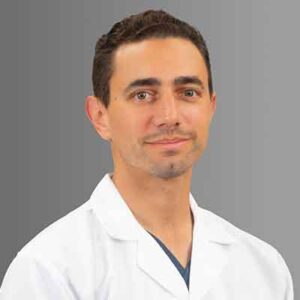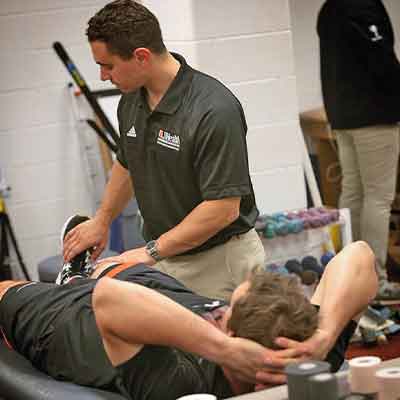ARH orthopedic surgeon Philip Collis, MD, relies on more than surgery to help his patients.
HAZARD Philip Collis, MD, is an orthopedic surgeon specializing in sports medicine at Appalachian Regional Healthcare (ARH). The duties of a surgeon are only some of the ways Collis spends his day treating his patients. With constant innovation and advancements in orthopedics and a commitment to a continuum of care at ARH, he can provide options for his patients beyond the operating table.
“Because of our title—orthopedic surgeon—the biggest misconception is that everything needs to be treated with surgery,” says Collis. “Maybe 80 to 90 percent of what we treat as orthopedic surgeons is non-operative. It’s more about managing patients, trying to avoid surgery, and trying to optimize their outcomes without having to undergo surgery.”

Like many orthopedic surgeons, Collis was drawn to the specialty partly because of his athletic background. Growing up in Columbus, Ohio, he played soccer and basketball in high school and suffered what he terms “the typical run-of-the-mill sports injuries,” which introduced him to the world of sports medicine.
Collis was a pre-med major at Vanderbilt University, then attended the University of Louisville School of Medicine. He did a surgical internship at Orlando Regional Medical Center, followed by an orthopedic surgery residency back at the University of Louisville. He later completed a fellowship in sports medicine at the University of Miami (Florida). Collis joined ARH in 2022.
Like many orthopedic surgeons, his positions have included working with local athletic programs. Collis was Western Kentucky University’s basketball physician for four years, and during his time in Florida, he worked with the University of Miami’s football and basketball teams as well as Major League Baseball’s Miami Marlins. In his current role at ARH, he serves as the local sports surgeon for the athletic teams in and around Hazard.
“The biggest difference between covering the college athletic programs and high school athletics is the amounts of resources that you have,” says Collis. “In college athletic departments, they have full-time athletic trainers for every sport and they have all sorts of resources when it comes to rehabbing, diagnosing, and assisting with the care of the athletes. When it comes to the high school level, we don’t have athletic trainers for all of the school’s sports here, so we rely more heavily on physical therapists. It’s up to the patient, the therapist, and myself to coordinate the patient’s rehabilitation program.”
The Patient Interview Is Key
In the sports medicine side of his practice, Collis treats a variety of injuries, primarily to the shoulder or knee. For the shoulder, he performs arthroscopic surgeries, including rotator cuff and labrum repair. For the knee, he performs arthroscopic surgeries, including meniscus repair, ACL reconstruction, and other ligament reconstruction of the knee.
Collis estimates that close to 75 percent of his practice is either sports-related or acute injury. The other 25 percent is composed primarily of chronic conditions, where he frequently treats patients with arthritis, chronic pain, or in need of a hip replacement. His patients range in age from adolescents to those 80 years old and up.
Regardless of the patient’s age or presentation, Collis places a high priority on the first meeting with the patient.
“It’s all about getting a good history, getting to know the patient, what their lifestyle is, and what their lifestyle was before they had an injury or debilitating pain,” says Collis. “Then I try to get a feel for what their goals are for their outcomes. What are they trying to get? Are they looking for something to deal with the pain, to deal with the function, or a combination of the two? Once we know that, we tailor our outlook and treatment plan based on their individual circumstances. Every patient has different wants and needs when they come in. We tailor our care based on what they are looking for and what their long-term goals are.”
The Nonsurgical Surgeon
For many patients, their goal is to avoid surgery. Collis, likewise, values the nonsurgical options.
“We try to lay out the easiest steps and treatments first and work our way up to whether or not they are a candidate for surgery,” says Collis.

The good news, Collis says, is that if surgery is required, minimally invasive techniques and other advancements ease the recovery process.
“Orthopedic surgery is still relatively new, but we have made a lot of advancements in a short period of time,” says Collis. “Even in the last 30 years, there has been such a rapid change in the way we treat things. Now, we have arthroscopic surgery and technological advancements in robotics. We are really focusing on minimally invasive procedures with more consistent and more predictable outcomes.”
Collis says that, in addition to his sports background, he was drawn to orthopedic surgery because it offered the opportunity to fix things rather than managing long-term treatment programs for prolonged illnesses. While he admires and respects the work of the medical professionals who perform that work, he finds it rewarding to be able to fix whatever is broken. That might mean helping an elderly patient regain their mobility and independence via a hip replacement or a young athlete returning to the playing field after an arthroscopic knee surgery.
“It’s a problem-solving thing when it comes to orthopedics,” he says. “A lot of times, we are presented with a problem that we can actually fix or address. There is satisfaction in helping a patient who comes in with an injury that’s really limiting their lifestyle and their happiness. It takes a toll on them in a lot of aspects—emotionally, financially, and physically. Being able to help them get through that and get back to their normal self and their normal lifestyle is the biggest thing that I get out of it.”
It doesn’t sound very medical or technical, but “Doctor of Helping People Feel Better” might be the most appropriate title for orthopedic surgeons like Collis. Committed to “fixing the problem,” using all the resources available.



